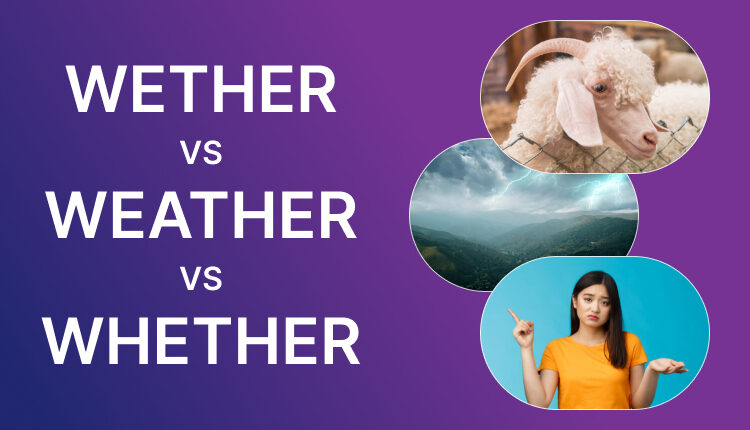Language can be quite tricky at times, especially when words sounded the same but meant an entirely different thing. Meet homophones: little linguistic puzzles that easily trip the most experienced writer.
Today, we’re exploring three such words—wether, weather, and whether. Not only do they sound identical, but each word fills a unique utility in our language. At the end of this article, you will confidently navigate these confusing terms without common pitfalls in your writing. Now, let’s unravel the mysteries behind each word one by one!
When to Use Weather + Original Examples
Weather refers to the atmospheric condition in a given place at a particular time. It’s all about temperature, humidity, rain, and sunshine. For example, “The weather today is perfect for a picnic.”
You can also use it while discourses on forecasts or climatic changes. For example, “The weather report indicates heavy rain tomorrow.” This means, all outdoor plans and travel arrangements are being made.
Remember that any mention of meteorological activities relates to “weather.” It is one’s favorite word when trying to explain what is happening in the open world.
Definition Wether
A wether is a castrated male sheep. This usually happens when the animal is still juvenile and even before it reaches sexual maturity. Castration helps control behavior and also makes the meat better.
Wethers are raised in agriculture since they raise wool or meat. They are relatively friendly to work with, compared to castrated rams, as they tend to be docile.
Although still a member of the flock, a wether serves as an invaluable companion animal to other animals. It plays an essential role in herding and managing flocks’ social structures.
Definition of Weather
Weather conditions are the state of the atmosphere at any given point and at any given location. These may include the presence of warmth, moisture in the air, rainfall or showers, and wind. All these can change within a relatively short period of time, hence affecting our daily activities.
Weather can become cloudy and start raining at any moment. Due to this knowledge of weather, individuals are prepared to face any seasonal changes.
Meteorologists watch for these trends with the latest technology so they can better predict what is coming down the pipe. From rain forecasts to snow alerts, being aware of the weather is critical to carrying out any activity and staying safe outdoors.
Whether definition
Whether is a coordinating conjunction that offers choices. It helps introduce alternatives in a sentence. For example, “I can’t make my mind whether to take a walk or stay indoors.”.
It often employs the word “or” to clarify contrasting possibilities. Listen for the construction, “He’s not sure if he’ll attend the meeting.” The employment of if-and/or indicates two different actions are unsure about which to do.
Whether additionally is found in sentences that involve doubt or conditional situations. Consider the sentence, “You should ask whether it’s worth your time.” Here, it emphasizes evaluation should occur before decisions are made.
How to Use Each Correctly
To use “weather,” speak about atmospheric conditions. For example, “The weather is sunny today.” This way, you can narrate rain, sunshine, or storms correctly.
“Wether” is a word applied to refer to castrated male sheep. In many situations, you may hear a person utter, “The farmer kept a wether for wool purpose.” This is rare but very helpful in agricultural use.
“Whether” introduces choices or options. Example: “I don’t know whether to go outside.” Remember this word often accompanies alternatives and is necessary to make comparisons. Knowing these differences will help you write much more clearly.
Some Quick Tips for Remembering the Difference
One good reminder is associating the word “weather” with the outdoors. Actually, the first thing that comes to mind would be sunny skies or rainy days. If you memorize the various kinds of weather conditions, it could help you recall the word.
In the case of “whether,” remember that it often introduces a choice. Connect it to decision-making scenarios like “Whether I go for a walk” or “Whether we eat out.” This way, it reinforces its meaning.
If you think of animals, you’ll remember “wether.” Remember a wether is a castrated male sheep; that reminds you that this is your odd one out in these three. Create mental images for each word; your brain will thank you later!
For even faster learning, Trinka’s Grammar Checker can instantly highlight these tricky homophones, ensuring you use the right word every time.
Quick Test on Wether, Weather and Whether
It is easy to get confused between wether, weather, and whether. Let’s test your knowledge.
1. Which of these words do you think you would use in this sentence? “I have to know ___ it is going to rain tomorrow.” (a) Wether (b) Weather (c) Whether
2. Fill in the blank: “The sheep were sheared because they had too many ___. ” (a) Weather (b) Wether (c) Whether
3. Which of these is the correct term here? “The forecast predicts sunny ___ for our picnic today.” (a) Wether (b) Weather (c) Whether
Take a minute to answer these questions before checking your responses! Understanding these homophones can lift your writing and communications skills just that much.

